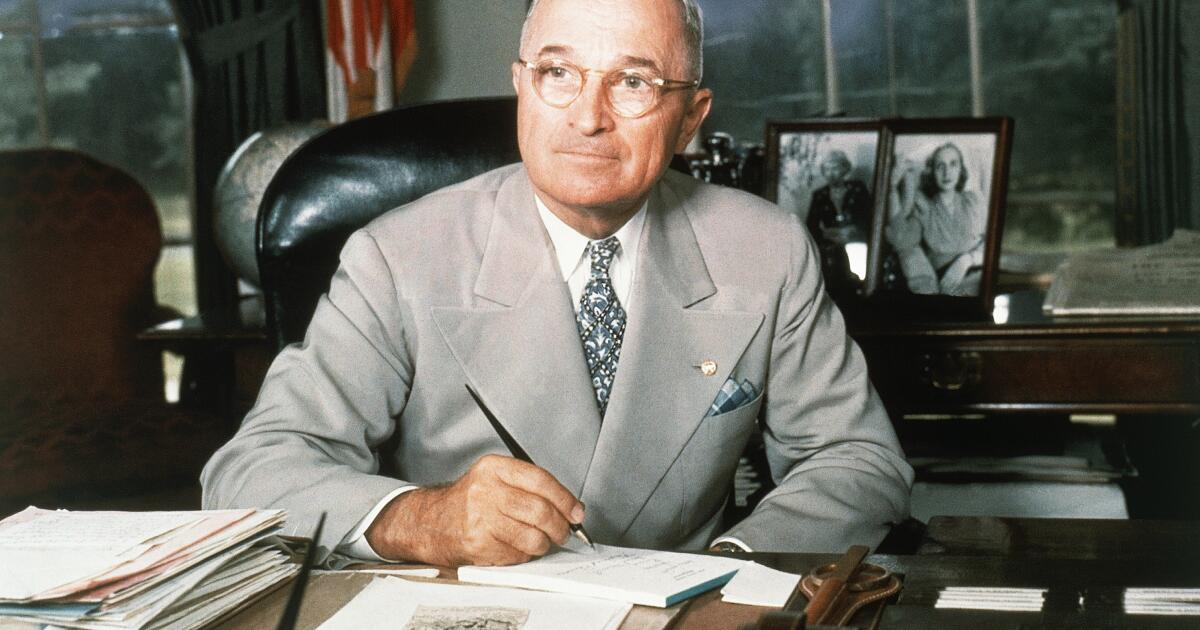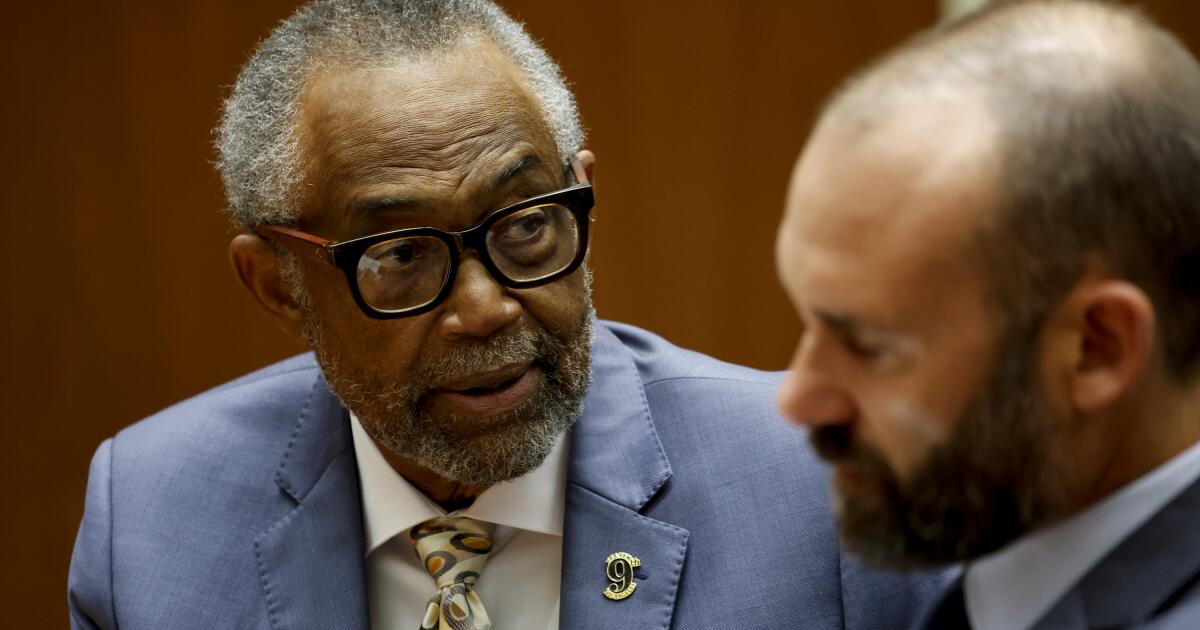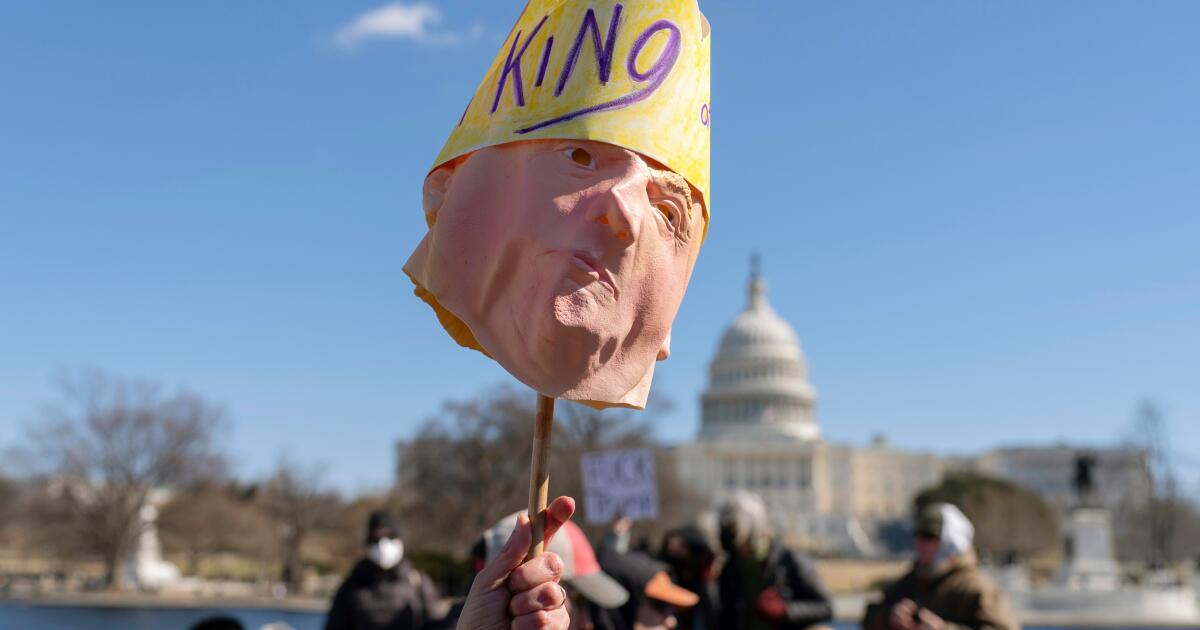Column: Trump imagines the buck will never stop with him
For just $95, the acquisitive President Trump could have a replica of the iconic “The Buck Stops Here” sign that sat atop President Truman’s Oval Office desk, gift-boxed from the Harry S. Truman Presidential Library and Museum Store. But this gewgaw isn’t gold; it’s wood. And yet that’s not the reason it wouldn’t be at home on Trump’s desktop.
Here’s why: As far as Trump is concerned, the buck never stops with him.
That’s never been more evident than this month, in the president’s fly-above-it-all attitude toward his administration’s armed occupation of Minneapolis. Ostensibly a campaign against immigrants who lack legal status, the occupation has (at this writing) killed two U.S. citizens exercising their 1st Amendment rights to protest the anti-constitutional brutality of federal agents.
Trump couldn’t even be bothered to postpone his black-tie White House screening of Amazon’s $75-million gift documentary of his wife, “Melania,” on Saturday, just hours after 37-year-old VA nurse Alex Pretti died and as Minneapolis seethed. When the president did interject, he mostly just escalated tensions. Again.
After the earlier killing of Renee Good, Trump posted to Minnesotans: “The day of reckoning and retribution is coming!” and deployed an additional 1,000 armed, masked agents for a total of 3,000. Further mayhem was widely predicted. And on Saturday, after at least two of those agents pumped 10 shots point-blank at Pretti while he was pinned down, Trump’s first reaction was this escalatory, blame-the-victim post over a photo: “This is the gunman’s gun, loaded (with two additional full magazines!), and ready to go.”
Got that? According to the president, Pretti was the gunman in what I and many other Americans saw as his murder by Trump’s militia. The buck, and the bullets, stopped with Pretti.
Trump continued to blame the victim for days, including on Tuesday in Iowa, by repeatedly contending (over the angry opposition of his pals in the gun lobby) that Pretti “shouldn’t have been carrying a gun.” It was a holstered handgun that Pretti legally owned and carried, which he never “brandished” as the feds claimed and which was taken from him before he was shot.
Not once in the year since he loosed this militant deportation campaign in U.S. cities has Trump openly questioned the lawless tactics. Since Pretti’s killing, the president hasn’t publicly upbraided his Department of Homeland Security or his most senior advisors — Stephen Miller, the White House architect of Trump’s anti-immigrant policies; Kristi Noem, his puppy-killing Homeland Security secretary; and Gregory Bovino, his cruelly performative (former) Border Patrol commander in Minneapolis (after Los Angeles, Chicago and New Orleans) — for their immediate and repeated slanders of Pretti as a “domestic terrorist” and “an assassin” who aimed to “massacre law enforcement.”
Those were all lies, as the world soon saw thanks to the courageous protesters on the scene documenting the agents’ lawlessness with cellphone cameras. And now, even some (few) Republicans in Congress are assailing Noem, Miller and Bovino, calling for their resignation, firing or, in Noem’s case, impeachment.
Enough, however, with the focus on Noem, Miller, Bovino or others of Trump’s “best.” It’s good that Republicans are finally rousing to object to administration actions. But they should quit cloaking their complaints in language that absolves the boss. These Republicans would have us believe that Trump is faultless, ill-served and misled by his advisors.
Among the foremost modelers of this behavior is Republican Sen. Thom Tillis of North Carolina, who grew a bit of spine in the summer after he announced that he wouldn’t seek reelection. Yet he still blames everyone around Trump, not Trump himself.
What Noem has done in Minnesota “should be disqualifying,” Tillis told reporters Tuesday. “It’s making the president look bad.” Later, he ranted about both Noem and Miller, lamenting that immigration used to be Trump’s and Republicans’ best issue until that duo “destroyed it through their incompetence.” Last week, he blamed Miller for “getting the president in a difficult circumstance” over Greenland, as if it wasn’t Trump himself who insanely demanded that Denmark and NATO allies hand over the island protectorate to the United States — because it’s “psychologically important for me.”
This is Trump’s paramilitary force at Immigration and Customs Enforcement and the Border Patrol. These advisors are his hires at the White House and in the Cabinet. And these are his policies.
The president is consistently the arsonist who attempts to take credit for putting out his own fires (like last week’s conflagration at Davos over Greenland) when they get out of control. Which is to say, when poll after poll confirms both the policies’ and Trump’s growing unpopularity.
Forget that he won’t accept the buck: It still should stop with him.
As Noem insisted in a statement to Axios on Tuesday: “Everything I’ve done, I’ve done at the direction of the president and Stephen [Miller].”
She and Bovino, heretofore so fond of cosplaying in getups that scream “I’m tough,” are now wearing tire tracks. With Trump’s dispatch of border advisor Tom Homan to Minneapolis, they’ve essentially been designated as scapegoats for the tragedies in Minnesota. But not Miller: “The president loves Stephen,” White House Press Secretary Karoline Leavitt told Axios.
Of course he does. Miller is Trump’s Mini-Me. Which brings us back to: Blame Trump.
The imperative to hold Trump accountable is why I’m cool to calls to impeach Noem. Democrats seeking her removal include House Minority Leader Hakeem Jeffries of New York and former Speaker Nancy Pelosi, and they’re joined by a few Republicans. It feels good to say it, and such calls are fine as a message of disgust, especially in a midterm election year. But Congress is Republican-controlled, remember, which is to say Trump-controlled.
For the same reason, Trump himself is insured — for now — against impeachment. But as he’s acknowledged, if Democrats take control after November, that would probably change. Forget that the Senate probably wouldn’t convict him, just as it declined to do twice after his impeachments in his first term. But at least, come 2027, he could be forced to take the buck.
Bluesky: @jackiecalmes
Threads: @jkcalmes
X: @jackiekcalmes




